#Peter kreeft
Text
“Prayer is the hospital for souls where we meet Doctor God.”
- Prayer for Beginners. Page 14; by Peter Kreeft
35 notes
·
View notes
Photo
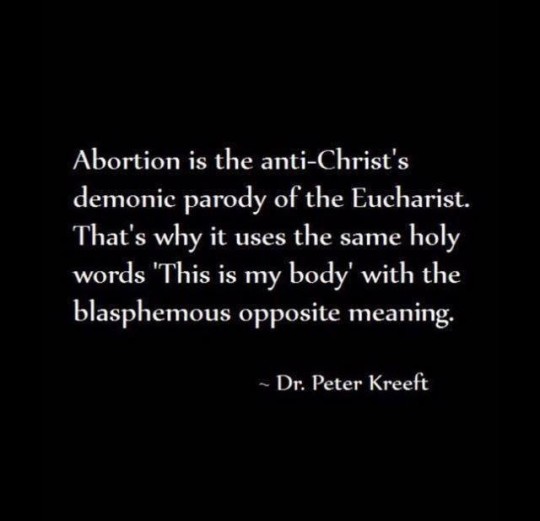
98 notes
·
View notes
Text
The very first step is to try to forget about the self altogether. He [C.S. Lewis] says elsewhere that that's the very definition of humility. Humility does not mean to have a low view of your self. It means to have no view of yourself. Having a low view of yourself is miserable--psychologists know that. And that's also the solution to the problem of introspection. If I ask myself, how am I doing, I come out with one of three answers: well, terribly, or so-so.
If I say I'm doing well, I'm a proud, self-righteous, arrogant, self-satisfied, priggish Pharisee; if I say I'm doing lousy, I'm a miserable worm with a guilt complex and I need some psychiatry; and if i say I'm sort of fair to midland then I'm dull, wishy-washy, Charlie Brown. So what's the solution? Don't look at yourself. Take your temperature when you're sick, otherwise look at other people and God. They're much more interesting. The first step is to try to forget about yourself altogether. Your real self, your new self, will not come as long as you are looking for it. It will come only when you're looking for Him.
Dr. Peter Kreeft
15 notes
·
View notes
Text
The highest pleasure always comes in self-forgetfulness. Self always spoils its own pleasure. Pleasure is like light; if you grab at it, you miss it; if you try to bottle it, you get only darkness; if you let it pass, you catch the glory. The self has a built-in, God-imaging design of self-fulfillment by self-forgetfulness, pleasure through unselfishness, ecstacy by ekstatis, "Standing-outside-the-self." This is not the self-conscious self-sacrifice of the do-gooder but the spontaneous unconscious generosity of the lover.
- Peter Kreeft
11 notes
·
View notes
Text
“The world was won by Christ not by arguments but by sanctity: ‘What you are speaks so loud, I can hardly hear what you say.’“
- Peter Kreeft
53 notes
·
View notes
Text
Pride is the total "my will be done."
Humility is "thy will be done." Humility is focused on God, not self. Humility is not an exaggeratedly low opinion of yourself. Humility is self-forgetfulness. A humble man never tells you how bad he is. He's too busy thinking about you to talk about himself. That's why humility is such a joy and so close to the beatific vision, where we will be so fascinated with God that we forget ourselves completely, like the mystics. Combining these two things—the will's total "not my will but thine be done" and the mind's total self-forgetfulness—we can perhaps begin to understand how the mystics find incomparable joy in becoming nothing. It is the mysterious thrill we feel when we sing to the Holy Spirit, "Blow, blow, blow till I be/ But the breath of the Spirit blowing in me."
Peter Kreeft
1 note
·
View note
Text
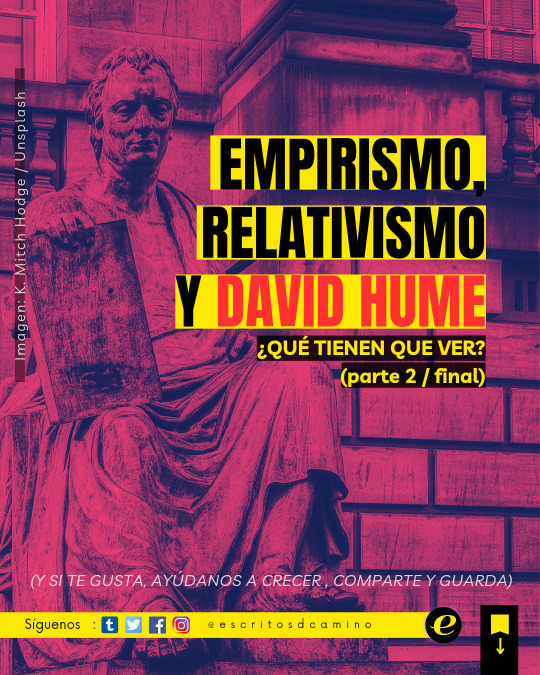
En el primer post vimos la “teoría emotiva de los valores” que nos dice, según Peter Kreeft, que la moral son nuestros sentimientos. En ese sentido, la moral no puede ser objetiva sino totalmente subjetiva, en cuanto depende del sentimiento de cada uno. En el libro “relativismo”, Kreeft continúa su explicación y el papel que David Hume juega en esta teoría:
“Libby: ¿Qué filósofo inventó la teoría emotiva de los valores?
Isa: Probablemente David Hume es el filósofo clave en este punto. Es el empirista que analizó los juicios morales como sentimientos subjetivos. “Matar es malo” significa, en el fondo, “a mí me repugna matar”.
Libby: Hume es del siglo XVIII, ¿verdad? ¿Cómo llega esta idea al siglo XX?
Isa: La filosofía más influyente en los países de habla inglesa fue el positivismo lógico y luego la filosofía analítica, su hija, y el héroe de ambas corrientes de pensamiento era Hume.
Libby: ¿Por qué?
Isa: Porque les hizo el favor de deshacerse de Dios. La filosofía analítica era una forma de humeanismo secular”.
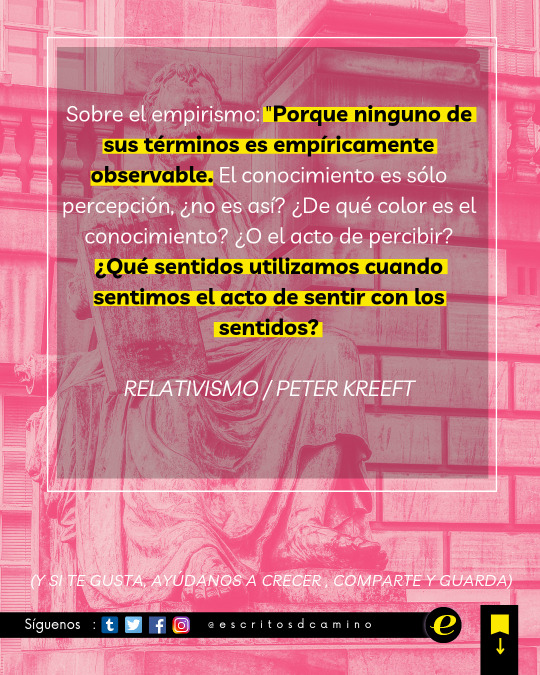
Como vemos, así como Kant cedió la objetividad moral ante Hume, Hume dejó la objetividad moral ante la experiencia de los sentimientos de cada uno. Pero en todo caso, Kreeft reconoce una contradicción:
“Isa: (…) una refutación aún más fácil del empirismo: es contradictorio. Dice que todo nuestro conocimiento se da por la percepción sensorial, pero el empirismo mismo no puede ser conocido por la percepción sensorial”. ¿Caminante, qué piensas de Hume y su relación con la “teoría emotiva de valores”? Comenta, guarda y comparte este post con alguien que aprecies. Te lo agradecemos. ¡Sigamos!

#catolicos#cristianismo#cristianos#catolico#católico#católicos#relativismo#relativismo moral#PeterKreeft#Peter Kreeft#DavidHume#David Hume#empirismo
3 notes
·
View notes
Text

reading Kreeft’s summa of the summa since I’d heard about it so much and also am too cowardly to approach aquinas’s summa without any significant handholding but jesus christ the editorializing in this - does he really think modern men don’t believe in objective values. is this the philosopher’s version of “needs to go outside and touch grass”
#peter kreeft#catholicism#thomas aquinas#summa theologica#I mean I suppose the modern man is more apt to question values#like their sources or ways of knowing#but fundamentally I think we're still the same.
2 notes
·
View notes
Video
youtube
How to Combat Hedonism | Dr. Peter Kreeft | #291
Dr. Peter Kreeft and Dr Jordan B Peterson discuss spiritual endeavor, delving deep into where we came from as a religious species, where we are now in the age of technology, and how we combat hedonism with personal sacrifice.
Dr. Kreeft is a professor in the field of Philosophy, and teaches at Boston College and the King’s College in New York. When Dr. Kreeft was a student, he was asked to examine Catholicism which led to his conversion. He’s written more than eighty books on the subject, such as “Handbook of Christian Apologetics” and “Socrates Meets Jesus.”
#jordan peterson#peter kreeft#discussion#hedonism#spiritual#religion#sacrifice#responsibility#tradition
1 note
·
View note
Text
We should be sceptical about everything, even scepticism.
Peter Kreeft, Faith & Reason
3 notes
·
View notes
Text
The Books Most Responsible
Some time ago, a friend of mine shared a list of her “books most responsible” for who she is and how she thinks, and I found myself wondering which books might appear on my list.
I’ve read many books (and have many, many more that I want to read), some of which have undoubtedly shaped me in some meaningful way and then been lost to the porous sands of my mind. But upon reflection, I believe…
View On WordPress
#A.G. Sertillanges#Augustine#Books#Books Responsible#C.S. Lewis#Craig Bartholomew#Drama of Scripture#Education#Encounter#Experience#Faith#Formation#George Seldon#Gilbert Meilaender#Helmut Thielicke#J.R.R. Tolkien#John Milton#Life#Michael Bauman#Michael Goheen#Michael Ward#Mind#Paul Maier#Peter Kreeft#Reading#Richard Mitchell#Scot McKnight#Thomas Sowell#Tish Harrison Warren
0 notes
Quote
The opposite of Christianity is not atheism, but idolatry.
Peter Kreeft
32 notes
·
View notes
Text
Beyond Reason: A Sense of the Sacred
My latest blog post is "Beyond Reason: A Sense of the Sacred." I hope you enjoy it!
Modern Scientific Skepticism vs. Archaic Mystical Belief Systems
The renowned, well-respected professor of Philosophy and writer in the field of Christian apologetics, Dr. Peter Kreeft, is the author of a number of books in which he deploys Socratic dialogue as a methodology for a logical, philosophical inquiry into the nature of truth and reality. In his enduring work, Socrates meets Jesus,…

View On WordPress
#acupressure#acupuncture#Aldous Huxley#Bible#breathwork#C.S. Lewis#Carnegie#Christianity#education#endocrine system#energy medicine#enlightenment#fluoride#ideas#Jesus Christ#John F. Kennedy#my-featured-post#perspective#Peter Kreeft#philosophy#pineal gland#qigong#religious awe#Rockefeller#sacred#sanctity of life#Socrates#sound healing#spirituality#thought
0 notes
Text
Pleasure is like light; if you grab at it, you miss it; if you try to bottle it, you get only darkness; if you let it pass, you catch the glory. The self has a built-in, God-imaging design of self-fulfillment by self-forgetfulness, pleasure through unselfishness, ecstasy by ekstasis, "standing-outside-the-self". This is not the self-conscious self-sacrifice of the do-gooder but the spontaneous, unconscious generosity of the lover.
This principle, that the greatest pleasure is self-giving, is graphically illustrated by sexual intercourse and by the very structure of the sexual organs, which must give themselves to each other in order to be fulfilled.
��
0 notes
Text
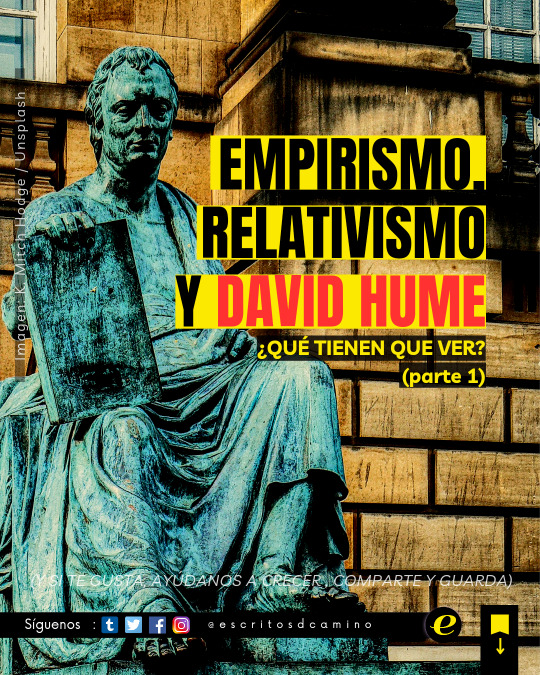
Como vimos en el caso de Inmanuel Kant, otros filósofos contribuyeron a debilitar el realismo precedente que vivía una moral objetiva para pasar a un subjetivismo cada vez más acentuado que abrió las puertas al relativismo moral hacia el s. XX. En su libro: “Relativismo”, Peter Kreeft lo revela de manera sencilla:
“Isa: (…) Luego, en reacción contra el racionalismo, el empirismo reemplazó la razón por la sensación como el único camino fiable hacia la certeza. Más tarde, en el siglo XIX, el romanticismo reemplazó la razón por la emoción.
Libby: ¿Qué tiene que ver el empirismo con el relativismo moral?
Isa: El empirismo desembocó en la así llamada “teoría emotiva de los valores”: la idea de que juicios morales como “matar es malo” son en realidad expresiones de los sentimientos subjetivos del que habla sobre matar, en vez de declaraciones sobre la naturaleza real y objetiva del acto de matar; en otras palabras, “no hay nada bueno o malo, sino que el pensamiento hace que las cosas sean lo uno o lo otro”.
Libby: ¿Y por qué piensas que esta teoría proviene del empirismo?
Isa: Porque el bien o el mal morales no se ven con los ojos ni se oyen con los oídos. No se registran en ninguno de nuestros sentidos físicos. Por eso, si eres empirista y reduces todo el conocimiento de la realidad objetiva al conocimiento sensible, ¿dónde pones la moral? Si lo real no es sensorial, no es objetivo, no es objetivamente real, no hay ningún conocimiento objetivo de la realidad. Por lo tanto, la moral debe ser subjetiva, estar dentro de nosotros, debe provenir de nosotros, debe ser relativa a nosotros. La teoría emotiva dice que la moral son nuestros sentimientos.
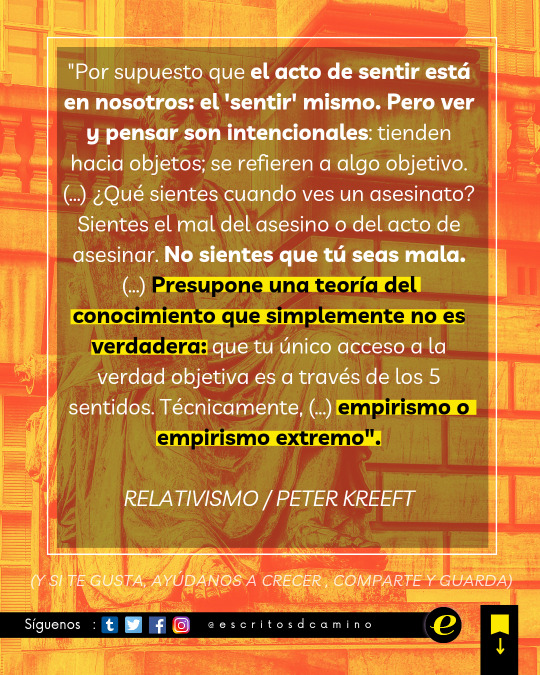
Libby: Supongo que esta propuesta vino del romanticismo.
Isa: Así es”.
¿Conocías el efecto del empirismo en el subjetivismo moral? Comenta, guarda y comparte este post con alguien que aprecies. Te lo agradecemos. ¡Sigamos!

#católico #catolico #católicos #catolicos #catolicosoy #cristiano #DavidHume #PeterKreeft #Relativismo #soycristiano #EscritosDCamino #EscritosDelCamino #santidad #romanticismo
#catolicos#cristianismo#cristianos#catolico#católico#católicos#relativismo#relativismo moral#PeterKreeft#Peter Kreeft#DavidHume#David Hume#Empirismo
0 notes
